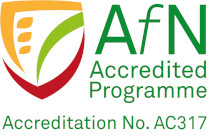BSc Nutrition
-
UCAS code
B5D7 -
A level offer
ABB -
Year of entry
2026/27 -
Course duration
Full Time: 3 Years
-
Year of entry
2026/27 -
Course duration
Full Time: 3 Years
Learn about the links between nutrition and health, both on an individual and societal level, with our BSc Nutrition course.
The science of nutrition is vital to our individual and collective wellbeing. As consumers grow more aware of the importance of healthy eating, nutritionists become increasingly important to the food industry and society as a whole.
On our BSc Nutrition course, you will:
- learn how diet can influence health and the likelihood of developing diseases such as cardiovascular disease, diabetes, obesity, and dementia
- discover the impact that nutrients have on cells, tissues and organs
- learn how public health advice is underpinned by clinical evidence.
In your first year of study, you will focus on fundamental science modules such as physiology, chemistry and microbiology. These modules will provide the scientific knowledge that underpins your later studies.
In your second year, you’ll develop your understanding of nutritional sciences and key methodologies. Modules will cover a wide range of topics, such as fundamental nutrition, issues in food choice, and links between nutrition and health on an individual and societal level.
Your final year of study will provide the opportunity to work in multi-disciplinary teams – for example, in the development of a new food product or healthy living assessments.
Throughout your degree, you will study an integrated approach to the scientific disciplines related to nutrition and health. You will also:
- undertake research into the science of diet and health
- develop your ability to critically evaluate research into the science of food and health
- learn how scientific knowledge in nutrition, diet and health can be applied to the needs of consumers, industry and food regulators.
Professional accreditation
Our BSc Nutrition course has gained accreditation by the Association for Nutrition and Institute of Food Science and Technology (IFST).
This accreditation will enable you to become an Associate Nutritionist (ANutr) after graduation, and a Registered Nutritionist (RNutr) with approximately three years of professional experience.
Your learning environment
We offer a supportive environment where you will learn from world-leading experts, through lectures, problem-based learning, group projects, and hands-on practical work in the laboratory.
Our staff are actively engaged in cutting-edge research and will tailor their teaching to reflect changing trends and emerging technologies in nutritional science. 100% of our students said the course has developed the knowledge and skills they think they will need for their future (National Student Survey 2025, responders from the Department of Food & Nutritional Sciences). 100% of our students said teaching staff are good at explaining things (National Student Survey 2025, responders from the Department of Food & Nutritional Sciences). We are ranked 3rd in the UK for Nutrition and Food Science (Guardian University Guide 2026).
The University of Reading has one of the largest Food and Nutritional Sciences departments in the UK, with extensive facilities that enable us to engage in diverse teaching and research. Our facilities include:
- Laboratory space – including a chemical analysis facility with NMR spectrometers, mass spectroscopy and x-ray diffraction facilities
- The Hugh Sinclair Unit of Human Nutrition – a leading facility for research into the effect of diet on vascular health and body composition
- Flow Cytometry Suite – a technological suite that enables us to assess the impact of pharmaceuticals and dietary supplements, such as antibiotics, probiotics and prebiotics.
Placement opportunities
If you are interested in undertaking a professional placement before your final year of study, we offer a BSc Nutrition with Professional Training course.
The Department of Food and Nutritional Sciences has well-established links with high profile placement providers, ranging from household names to suppliers of branded and own-label goods.


